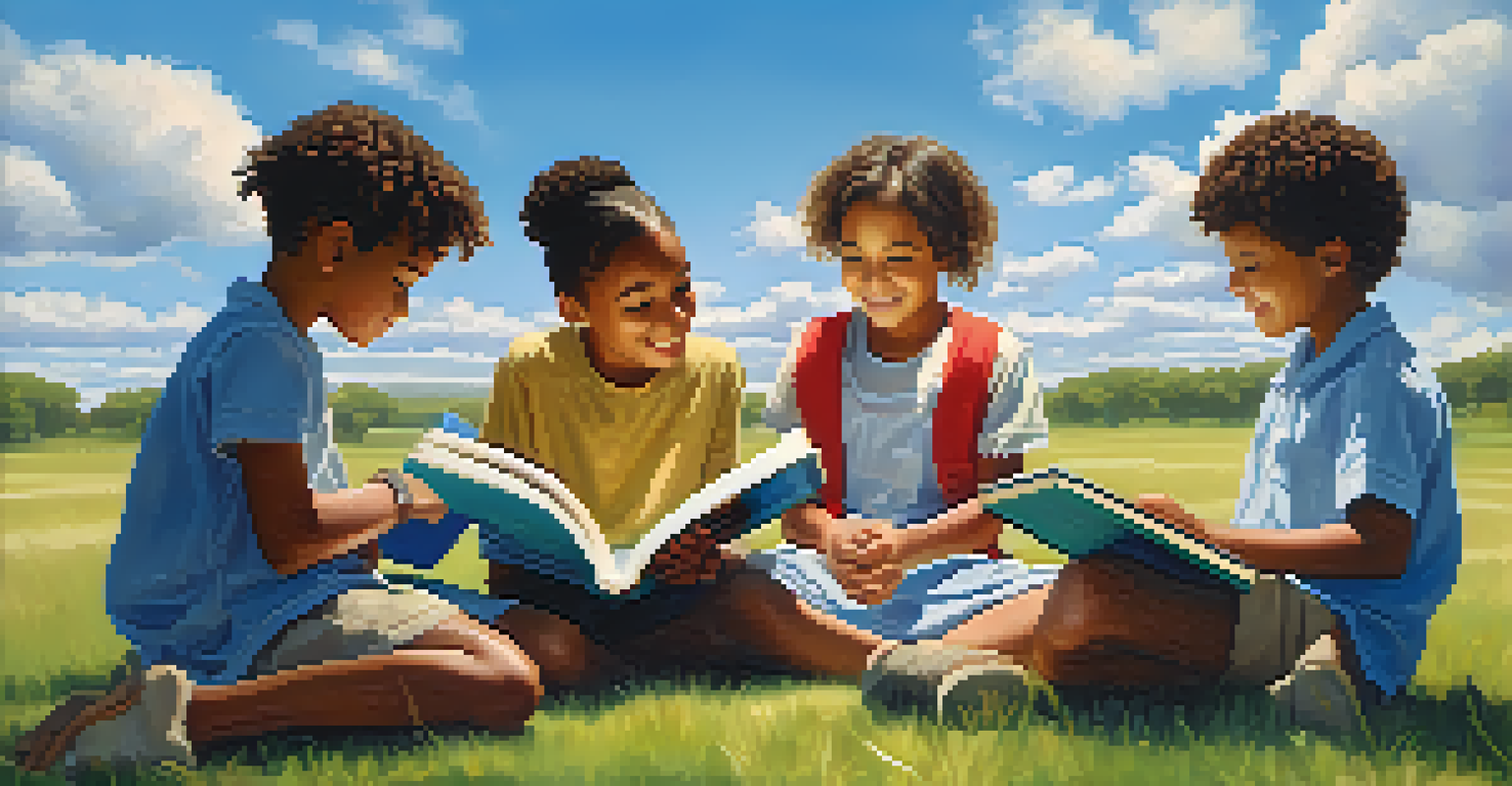The Benefits of Reading Diverse Authors and Perspectives

Understanding Different Cultures Through Literature
Reading works by diverse authors allows us to step into their shoes and experience their unique cultures. This exposure fosters a deeper understanding of societal norms, values, and traditions that may differ from our own. For instance, a novel set in a remote village can transport us to a world we might never encounter otherwise, broadening our horizons.
Literature is a source of empathy and understanding, a way to live many lives in one lifetime.
When we engage with these stories, we often find commonalities that unite us as human beings, despite our differences. This shared experience helps to build bridges between cultures and promotes a sense of global community. By understanding the nuances of various cultures, we can appreciate the richness of diversity in our world.
Ultimately, literature serves as a powerful tool for cultural exchange. It breaks down barriers and encourages dialogue, helping us to become more open-minded and accepting of others. In a world that often feels divided, embracing diverse narratives is a step toward unity.
Fostering Empathy and Emotional Intelligence
Reading stories from diverse perspectives can significantly enhance our empathy. When we immerse ourselves in the thoughts and feelings of characters from different backgrounds, we learn to see the world through their eyes. This practice not only enriches our emotional landscape but can also improve our relationships in everyday life.

For example, a memoir detailing the struggles of an immigrant family can evoke compassion and understanding for their experiences. Such narratives compel us to confront our biases and challenge preconceived notions, leading to personal growth. As we relate to the characters’ emotions, we become more equipped to empathize with those around us.
Literature Enhances Cultural Understanding
Reading works by diverse authors allows us to experience different cultures and fosters a deeper appreciation for societal norms and values.
Moreover, empathy gained through literature can translate into meaningful action. It encourages us to stand up for marginalized voices and advocate for change. By reading diverse authors, we cultivate a more caring and socially aware society.
Enhancing Critical Thinking and Perspective-Taking
Engaging with a variety of voices encourages us to think critically about our beliefs and assumptions. When we encounter viewpoints that differ from our own, it prompts us to question why we think the way we do. This critical examination is essential for personal development and intellectual growth.
Books are a uniquely portable magic.
For instance, a dystopian novel written from a non-Western perspective may challenge the narrative we are accustomed to. By grappling with these differing viewpoints, we learn to appreciate complexity and nuance, which is vital in today’s polarized world. It also teaches us that there are often multiple sides to a story.
As we develop the skill of perspective-taking, we become more adaptable and open-minded. This not only enriches our reading experience but also prepares us for real-world interactions, where understanding different viewpoints is crucial for effective communication and collaboration.
Encouraging Creativity and Imagination
Diverse authors introduce us to new ideas, themes, and storytelling techniques that can ignite our creativity. When we read works from various cultures and backgrounds, we encounter fresh narratives that challenge the conventional. This exposure can inspire us to think outside the box, both in our writing and in our everyday lives.
For example, a magical realism story set in Latin America might weave in cultural folklore that transforms the ordinary into the extraordinary. This blend of the familiar and the fantastical can spark our imagination and encourage us to explore unique storytelling methods in our own creative endeavors.
Diverse Stories Foster Empathy
Engaging with narratives from various perspectives enhances our empathy and emotional intelligence, helping us relate better to others.
Ultimately, embracing diverse literature enriches our creative toolkit. It reminds us that there are countless ways to tell a story and express ourselves, making our own contributions to the literary world more vibrant and varied.
Building Awareness of Social Issues and Injustice
Reading works by diverse authors often sheds light on social issues that may be overlooked in mainstream narratives. Through their stories, we gain insights into the struggles and triumphs faced by marginalized communities. This awareness is crucial for fostering social justice and advocating for change.
For instance, a novel centered on racial inequality can provide a visceral understanding of the challenges faced by those affected. By engaging with these stories, we become more informed citizens, capable of discussing and addressing pressing social issues. Literature serves as a mirror reflecting society's flaws and triumphs, urging us to take action.
Moreover, awareness gained through reading can inspire empathy and encourage us to support movements for social change. By amplifying diverse voices, we contribute to a more equitable society where everyone's story is valued.
Creating a Sense of Belonging and Representation
For many readers, seeing themselves represented in literature is a powerful experience. Diverse authors create characters that reflect a wide range of identities, allowing readers from those backgrounds to find solace and connection. This representation is vital for fostering a sense of belonging and validation in a world that can often feel isolating.
When young readers encounter protagonists who look like them or share similar experiences, it can inspire them to embrace their own identities. This sense of representation can empower individuals to pursue their dreams and aspirations, reinforcing the idea that their stories matter. It’s a reminder that everyone deserves to see themselves reflected in the pages of a book.
Representation Builds Community
Seeing diverse identities in literature creates a sense of belonging and encourages underrepresented voices to share their stories.
Furthermore, representation in literature promotes inclusivity and diversity in storytelling. It encourages aspiring writers to share their unique voices, contributing to a richer literary landscape. Ultimately, a diverse array of authors helps to create a more inclusive world where everyone feels valued.
Encouraging Lifelong Learning and Curiosity
Reading diverse authors cultivates a mindset of lifelong learning and curiosity. Each book opens a window into a new world, sparking questions and encouraging us to seek further knowledge. This thirst for understanding can lead us to explore unfamiliar topics, historical contexts, and cultural practices.
For example, a novel set in a historical context may pique our interest in that era, prompting us to research more about it. This curiosity not only enhances our reading experience but also enriches our understanding of the world around us. It reminds us that education is not confined to classrooms; it can be found in the pages of a book.

Moreover, the habit of seeking diverse perspectives nurtures a love for learning that lasts a lifetime. It encourages us to remain open-minded and receptive to new ideas, which is essential in an ever-changing world. Ultimately, this curiosity leads to personal growth and a deeper appreciation for the richness of human experience.